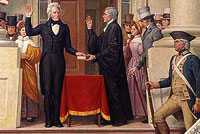BROWSE BY CATEGORY
- Archives and Libraries
- Blogs and Networking
- Bookmark This
- Digital Tools
- Examples of Teaching
- Exhibits
- Film Reviews
- History and Headlines
- Historic Sites and Museums
- Historical Thinking
- Holidays and Heritage
- Issues and Research
- Lesson Plans
- Material and Visual Culture
- Multimedia
- Organizations and Agencies
- Primary Sources
- Professional Development
- Publications
- Student Activities
- Teaching Materials
- Websites
Classroom Resources: Presidential Inaugurals

Inaugural parades and balls are as integral to the nation's history as the solemnity of the presidential oath of office and the inaugural address. A few of the many online resources ranging from primary source documents to quick quizzes are listed below.
Renewing America's Promise, the theme for the inauguration of Barack Obama as the 44th U.S. President on January 20, links the event to the 200th anniversary of the birth of Abraham Lincoln. The concept of "a new birth of freedom," words taken from Lincoln's Gettysburg Address, November 1863, underpin inaugural ceremonies.
Senator Dianne Feinstein (D-Calif.), chairman of the Joint Congressional Committee on Inaugural Ceremonies (JCCIC), explained the Committee's choice of theme. "It is especially fitting to celebrate the words of Lincoln as we prepare to inaugurate the first African-American president of the United States."
President-elect Barack Obama will take the oath of office on the same Bible upon which Abraham Lincoln swore March 4, 1861, to uphold the Constitution. Part of the collection of the Library of Congress the Lincoln Bible will go on display at the Library between February 12 and May 9, 2009, in an exhibit, With Malice Toward None: The Abraham Lincoln Bicentennial Exhibition.
Despite many historic parallels suggested between Obama, Lincoln, and other previous presidents, Boston Globe article "At Capitol, Slavery's Story Turns Full Circle" posits that many people are unaware that "When Barack Obama takes the oath of office at the U.S. Capitol, the first African American to become president will be standing amid stonework laid by slaves more than two centuries ago." (Michael Kranish, Boston Globe, December 28)
The New York Times emphasizes the opportunity of this election to examine the progress of African Americans in the electoral system. Take the quiz developed by two college professors, Paving the Way to the Inaugural Ball, and get instant answers and contextual information. Did you know, for example, that the first African American welcomed at the White House for an inaugural celebration was Frederick Douglass? The detailed answer explains that Douglas, like many white celebrants, tried to enter the white house without an invitation, and was denied entrance. "Lincoln heard and demanded Douglass be admitted and greeted him warmly."
The JCCIC provides historical perspectives on activities such as the inaugural parade, Facts and Firsts, and the history of inaugural balls.
The Library of Congress offers a collection of approximately 400 items or 2,000 digital files relating to inaugurations from George Washington's in 1789 to George W. Bush's inauguration of 2001. The presentation, I Do Solemnly Swear, includes diaries and letters of presidents and of those who witnessed inaugurations, handwritten drafts of inaugural addresses, broadsides, inaugural tickets and programs, prints, photographs, and sheet music. Materials are compiled from an array of divisions within the Library, and from the White House, the United States Senate, and the Architect of the Capitol Office of the Sergeant at Arms.
The National Archives has digitized over 3,000 documents relating to presidential inaugural addresses. George Washington's First Inaugural Address is among those available for online reading. For those visiting the Washington, DC area, the Archives downtown at Constitution Avenue and 7th Street also offers special programs and exhibits on inaugural history.
The History News Network highlights 35 hot topics associated with inaugurals in articles such as The Best and Worst of Inaugural Addresses and The Controversy Over Prayer at the Inauguration.
The University of North Carolina School of Education's Learn.org has compiled comprehensive annotated resources under the title, Presidential inaugurations in historical perspective. Topics include inaugural addresses and oaths of office, collections and online exhibits, teaching about presidential inaugurations, general presidential references, and a look at Inauguration 2009.
Further lesson plans for grades K12 appear at Education World and Edsitement.
The White House Historical Association offers A Brief History of Presidential Inaugurations through essays, images, trivia, and tidbits.